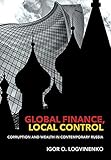Global Finance, Local Control : Corruption and Wealth in Contemporary Russia / Igor O. Logvinenko.
Material type: TextSeries: Cornell Studies in MoneyPublisher: Ithaca, NY : Cornell University Press, [2021]Copyright date: ©2021Description: 1 online resource (246 p.) : 5 chartsContent type:
TextSeries: Cornell Studies in MoneyPublisher: Ithaca, NY : Cornell University Press, [2021]Copyright date: ©2021Description: 1 online resource (246 p.) : 5 chartsContent type: - 9781501759604
- 9781501759628
- Globalization -- Economic aspects -- Russia (Federation)
- Globalization-Economic aspects-Russia (Federation)
- Russia (Federation) -- Foreign economic relations
- Russia (Federation)-Economic conditions-1991-
- Russia (Federation)-Foreign economic relations
- General Economics
- Soviet & East European History
- POLITICAL SCIENCE / World / Russian & Former Soviet Union
- financial globalization in Russia, oligarchs and global finance, Russian stock market, internationalization of Russian economy, investing in russia
- 330.947 23
- HC340.12
- online - DeGruyter
| Item type | Current library | Call number | URL | Status | Notes | Barcode | |
|---|---|---|---|---|---|---|---|
 eBook
eBook
|
Biblioteca "Angelicum" Pont. Univ. S.Tommaso d'Aquino Nuvola online | online - DeGruyter (Browse shelf(Opens below)) | Online access | Not for loan (Accesso limitato) | Accesso per gli utenti autorizzati / Access for authorized users | (dgr)9781501759628 |
Frontmatter -- Contents -- Preface -- Acknowledgments -- Abbreviations and Acronyms -- Note on Transliteration -- Introduction: Russia as a Globalized Kleptocracy -- 1. Local Control and Global Access -- 2. Episode 1: Dividing the Debris of the Soviet Colossus (1987–94) -- 3. Episode 2: The Oligarchs Embrace Openness (1995–98) -- 4. Episode 3: State Capitalism Goes Global (1999–2008) -- 5. Coda: Financial Openness as a Mainstay of Kleptocratic Capitalism (2009–2020) -- Conclusion: Western Finance and Russian Politics -- Appendix -- Notes -- Bibliography -- Index
restricted access online access with authorization star
http://purl.org/coar/access_right/c_16ec
Exploring Russia's re-entry into global capital markets at the dawn of the twenty-first century, Global Finance, Local Control shows how economic integration became deeply entangled with a bare-knuckled struggle for control over the vestiges of the Soviet empire. Igor Logvinenko reveals how the post-communist Russian economy became a full-fledged participant in the international financial sector without significantly improving the local rule of law.By the end of Vladimir Putin's second presidential term, Russia was more integrated into the global financial system than at any point in the past. However, the country's longstanding deficiencies—including widespread corruption, administration of justice, and an increasingly overbearing state—continued unabated. Scrutinizing stock-market restrictions on foreign ownership during the first fifteen years of Russia's economic transition, Logvinenko concludes that financial internationalization allowed local elites to raise capital from foreign investors while maintaining control over local assets. They legitimized their wealth using Western institutions, but they did so on their terms.Global Finance, Local Control delivers a somber lesson about the integration of emerging markets: without strong domestic rule-of-law protections, financial internationalization entrenches oligarchic capitalism and strengthens authoritarian regimes.
Mode of access: Internet via World Wide Web.
In English.
Description based on online resource; title from PDF title page (publisher's Web site, viewed 01. Dez 2022)


